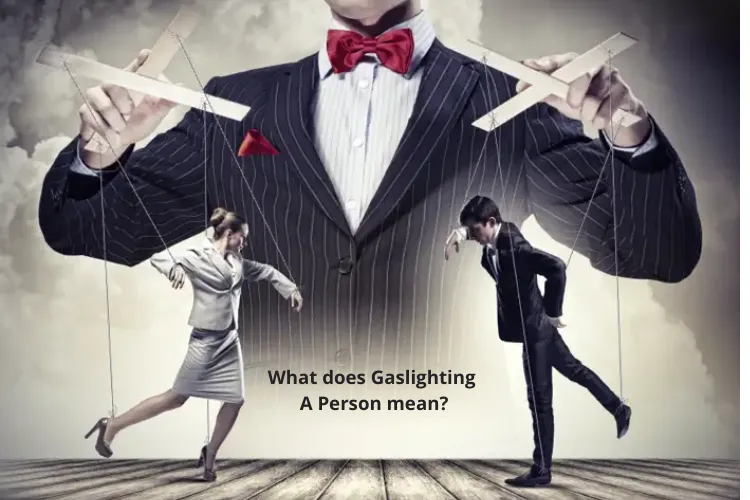Do you know someone who constantly makes you feel anxious, makes you question your reality or leaves you feeling like you constantly need to apologize? This could be Gaslighting. The term “Gaslight” originated in Patrick Hamilton’s 1900s drama “Angle Street,” which was later evolved in Alfred Hitchcock’s film “Gas Light,” in which the male protagonist manipulates his wife into thinking she is losing her mind by gradually and steadily dimming the flame of a gas lamp, and it then goes on to abuse and controlling her, cutting her off from family and friends. Psychologists and counselors invented the term “Gaslighting” to characterize this form of emotionally abusive behavior since this film accurately illustrates deceiving people’s manipulative and detrimental behaviors.
What is Gaslighting and where does it occur?
Psychologists define “Gaslighting” as a sort of manipulation in which the manipulator attempts to persuade someone else (or a group of people) to doubt their own reality, memory, or perceptions. It may begin with apparently minor offenses. But the trouble is that even little instances of you questioning your own judgment or reality as a result of someone else’s purposeful aim can escalate. You can become caught in a pattern of not being able to navigate your everyday life in a way that allows you to think straight, focus, make sound decisions, and feel well. While gaslighter may convince you that what they are doing to you is for your benefit and that you should respect them. Whatever their actions, they are typically wracked with worry at the prospect of losing you. They could also lack the emotional intelligence and ability to recognize that they are a gaslighter and are deceiving you.
Gaslighting occurs in personal relationships (such as an abusive spouse or, in rare circumstances, parents), professional connections (such as a manipulative boss or colleague preying on a subordinate), and even by public personalities. Racial gaslighting occurs when people use gaslighting tactics to disparage an entire racial or ethnic community.
What are Common Signs of Gaslighter?
Gaslighting may take many forms and is often done in stages. Some of the most common signs of gaslighter are:
• Gaslighters are frequently pathological liars with narcissistic traits. It is common for them to openly lie and refuse to withdraw or alter their statements, even when presented with evidence of their lying.
• They typically use false praise or signs of gratitude, leading you to wonder if they are truly abusive or if you misconstrued them.
• When confronted with a gaslighter, they may attempt to distract the matter by presenting a question rather than addressing the issue at hand. This not only takes you off track but also makes you wonder why you should continue a conversation if they don’t feel forced to react.
• Blame-shifting is another common method where every encounter you have is distorted in such a way that you are held accountable for everything that occurs. Even if you try to convey how the abuser’s actions make you feel, they may alter the matter to a degree that you question whether you are the cause of their misbehaving.
• Downplaying/minimizing their hurtful actions or words seem less serious by stating things such, as “It was just a joke” or “You’re much too sensitive.”
• Attempting to smooth things over with charming words that do not correlate to their deeds. They may say something like, “You already know how much I admire you. I would never intentionally injure you.”
• Making up a tale to explain their abusive behaviors.
• Spreading rumors about you or saying that others are criticizing you.
What are a few Signs that you’re Experiencing Gaslighting include?
• A constant urge to apologize
• The belief that you are incapable of performing any task adequately
• Feelings of nervousness, anxiety, or concern on a regular basis and lack of self-assurance
• Constantly questioning if you’re overly sensitive
• Feeling disconnected from your sense of self as if you’re losing your identity
• Blaming yourself when things go bad
• A persistent sense that something is wrong, even if you can’t specify what’s wrong
• A persistent feeling of pessimism, dissatisfaction, or emotional numbness.
Are you facing any relationship distress? Speak to our wellness experts at Ganeshaspeaks.com
What to do if you’re Getting Gaslighted?
• Taking a step back from the overwhelming emotions that gaslighting may provoke might be beneficial. Physically leaving the situation can be good, but you could also try some soothing tactics like deep breathing or grounding exercises.
• Focus on documenting your experiences since gaslighting might cause you to doubt yourself. Keep a diary, record text messages, and retain emails to remind yourself not to doubt or question yourself.
• Boundaries show people what you are willing to tolerate in a relationship. Make it clear that you will not allow the other person to dismiss or belittle what you have to say.
• Accept and acknowledge that what you feel is okay and track your feelings.
• Talk to a friend or family member about your feelings. Having another person’s viewpoint can help you understand the problem better.
• While it might be tough, terminating a relationship with someone who gaslights you on a regular basis is typically the most effective approach to stop the abuse.
• Lastly be kind to yourself. Even if you are not in a difficult spot, this is quite difficult. When you don’t feel confident or powerful, it’s far more difficult to give yourself the benefit of the doubt, kindness, and love. It will be therapeutic for you and will aid in decision-making. Now is the time to focus on yourself.
Don’t let gaslighting take a toll on your mental wellbeing. Seek help at Ganeshaspeaks.com to prioritize your mental health.



